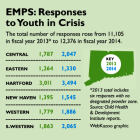Amy Evison
Mental Health Crisis Teams Bridge Service Gap To Stabilize At-Risk Youth
|
The growing number of children and teens exposed to traumatic events in everyday life has forced the state’s crisis intervention teams to respond to a broader range of behavioral and mental health issues, and those teams often serve as a bridge until at-risk youth find appropriate outpatient or inpatient services. Sixty-four percent of Connecticut’s youth who use Emergency Mobile Psychiatric Services (EMPS), the state’s mobile crisis intervention team, have experienced one or more traumatic incidents, such as domestic violence, cyber-bullying, physical assaults, or gang warfare, experts report. Research shows childhood exposure to violence, physical or sexual abuse, and other traumatic events can cause chronic health and behavioral health problems, and such exposure is associated with increased involvement with the child welfare and criminal justice systems.
“The number of children who have been exposed to trauma is a significant concern. It’s a common occurrence among young people,” said Jeffrey Vanderploeg, vice president for mental health initiatives for the Child Health and Development Institute of Connecticut (CHDI). He is director of the EMPS Performance Improvement Center, which is housed at CHDI.
